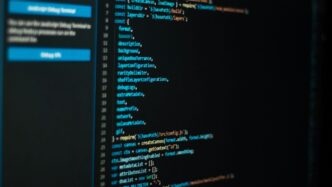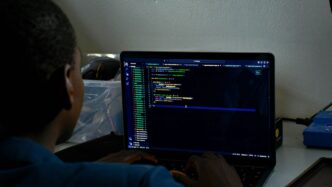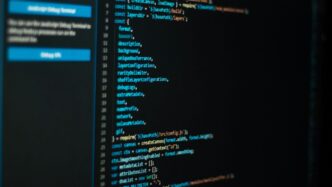So, you’re looking into computer science and wondering where to start with all the articles out there? It can feel like a lot, right? This guide is here to break down the important stuff, covering the basics, the topics you really need to know, and even some of the cooler, newer areas. Think of it as a map to help you find the best computer science articles for students.
Key Takeaways
- Start with the core ideas like algorithms and data structures to build a strong base.
- Understand how computers work internally with architecture and hardware basics.
- Explore practical areas like web development and databases, as many jobs use these.
- Consider advanced topics like AI, machine learning, and cybersecurity for specialized roles.
- Build projects and join communities to gain hands-on experience and connect with others.
Foundational Computer Science Concepts For Students
Understanding The Core Principles Of Computer Science
Computer science is all about figuring out how computers work and how they handle information. It’s a big field, covering things like how to write code, how to organize data, and how computers themselves are built. Think of it as learning the language and the tools that make computers do what we want them to do. It’s not just about coding; it’s about logical thinking and problem-solving.
Here are some of the main ideas you’ll run into:
- Problem Decomposition: Breaking down a big problem into smaller, more manageable pieces. This makes it easier to tackle complex tasks.
- Abstraction: Focusing on the important details and ignoring the less important ones. This helps simplify complex systems.
- Pattern Recognition: Identifying similarities and trends in data or problems to create more efficient solutions.
- Algorithmic Thinking: Developing step-by-step instructions (algorithms) to solve problems. This is the heart of how computers operate.
Key Concepts And Terminologies In Computer Science
As you start your computer science journey, you’ll hear a lot of new words. Getting a handle on these terms is pretty important for understanding everything else. You’ll see things like:
- Variables: These are like containers for data in a program. They can hold numbers, text, or even true/false values.
- Functions: Think of these as mini-programs within a larger program. They do a specific job and can be used over and over.
- Loops: These let you repeat a set of instructions multiple times. Useful for tasks that need doing again and again.
- Conditionals: These are like ‘if-then’ statements. They let your program make decisions based on certain conditions.
Knowing these basics helps you understand more advanced topics. You’ll also come across terms like object-oriented programming, recursion, and different types of algorithms. Getting familiar with these will help you talk to other people in the field and understand what they’re talking about. It’s like learning the lingo.
The Importance Of Algorithms And Data Structures
Algorithms and data structures are really the backbone of computer science. An algorithm is just a set of instructions to solve a problem. Think of a recipe – it’s an algorithm for making a cake. In computer science, these instructions tell the computer exactly what to do, step by step.
Data structures, on the other hand, are ways to organize and store data so it can be used efficiently. Imagine trying to find a specific book in a library where all the books are just thrown in a pile versus a library where they’re neatly organized by genre and author. The organized library makes finding that book much faster.
Some common data structures include:
- Arrays: A list of items, stored in order.
- Linked Lists: A sequence of items where each item points to the next one.
- Trees: A hierarchical structure, like a family tree, with a root and branches.
- Graphs: A collection of points (nodes) connected by lines (edges), used to represent networks.
Understanding how to choose the right data structure and how to write efficient algorithms can make a huge difference in how well a program runs. It’s about making your code fast and effective. You can find lots of great resources online, like Harvard’s CS50 course, which covers many of these foundational ideas.
Essential Computer Science Topics To Study
So, you’re diving into computer science and wondering what’s actually important to learn? It’s a big field, and it’s easy to get lost. Let’s break down some key areas that most students should get a handle on.
Computer Architecture and Hardware Fundamentals
Think about the physical stuff your code runs on. Understanding how computers are built, from the tiny transistors to how the CPU and memory talk to each other, gives you a real advantage. It’s not just about writing code; it’s about knowing the machine that executes it. You don’t need to be an electrical engineer, but grasping the basics of how hardware works helps you write more efficient software. It’s like knowing how an engine works before you start driving a car.
Databases and Data Storage Solutions
Almost every application needs to store information, right? That’s where databases come in. You’ll want to learn about different types of databases, like relational (SQL) and NoSQL, and understand how to design them. Knowing how to store, retrieve, and manage data efficiently is a big part of building any real-world application. It’s a skill that’s always in demand.
Web Development Essentials For Computer Science Students
Let’s face it, a lot of computer science jobs involve the web. Whether it’s building websites, web applications, or APIs, knowing the basics of web development is super useful. This includes things like HTML, CSS, and JavaScript for the front-end (what the user sees) and understanding server-side languages and frameworks for the back-end (how it all works behind the scenes). Getting a feel for how the internet works is pretty important.
Graphics Programming For User Interfaces
Most people interact with computers through a screen, so understanding how to create those visual interfaces is key. This area covers how to draw things on the screen, handle user input like mouse clicks and keyboard presses, and make applications look good and feel responsive. It’s about making software that’s not just functional but also pleasant to use. You can find some great beginner project ideas related to this here.
Here’s a quick look at some core topics and why they matter:
- Computer Architecture: How the physical parts of a computer work together.
- Databases: Storing and managing information effectively.
- Web Development: Building applications that run on the internet.
- Graphics Programming: Creating the visual elements users interact with.
Getting a solid grasp on these areas will set you up well for many different paths in computer science.
Advanced Computer Science Specializations
Once you’ve got a handle on the basics, computer science really opens up into some pretty specialized areas. These aren’t usually the first things you learn, but they’re where a lot of the really interesting, cutting-edge work happens. Think of them as the advanced electives in your CS degree, the stuff that can really set you apart for specific jobs.
Cryptography For Secure Communication
This is all about keeping information safe. When you send a message online, or make a purchase, you want to know it’s not being read by just anyone. Cryptography is the science of making and breaking codes. It involves complex math, like number theory, to create systems that are really hard to crack. Understanding how encryption works is key to everything from secure websites (HTTPS) to protecting your personal data. It’s a field that’s always evolving because people are always trying to find new ways to break codes.
Networking Concepts For System Understanding
Computers don’t exist in a vacuum; they talk to each other. Networking is how they do that. This covers everything from how your home Wi-Fi works to the massive infrastructure that makes the internet run. You’ll learn about things like IP addresses, routers, protocols (like TCP/IP), and how data travels across the globe. A solid grasp of networking is vital for anyone working with systems, cloud computing, or cybersecurity. It helps you understand why things are slow, why connections drop, and how to build reliable systems. You can find some good introductory material on network engineering.
Compilers And Programming Language Engineering
Ever wonder how your human-readable code (like Python or Java) actually gets turned into instructions a computer can understand? That’s where compilers come in. They’re complex programs that translate one language into another. This area involves a lot of theory about language design, parsing, and optimization. Building a compiler is a huge undertaking, and understanding how they work gives you insight into the very foundations of how software is made. It’s a deep dive into the mechanics of programming itself.
Distributed Systems For Scalability
Most modern applications don’t run on just one computer anymore. They run across many computers working together, often spread out geographically. This is a distributed system. Think about services like Google Search, Netflix, or online banking – they all rely on massive distributed systems to handle millions of users. Designing these systems is tricky because you have to deal with things like network delays, failures, and making sure all the different parts stay in sync. It’s about building systems that can grow and handle a lot of work without breaking.
Emerging Areas In Computer Science
Computer science isn’t just about what we know now; it’s also about what’s coming next. The field is always changing, and some areas are really starting to take off. If you’re looking to get ahead, knowing about these new frontiers is a good idea.
Artificial Intelligence and Machine Learning
Artificial Intelligence (AI) and Machine Learning (ML) are huge right now. Think about how your phone suggests the next word you’ll type, or how streaming services recommend shows. That’s AI and ML at work. These technologies let computers learn from data without being explicitly programmed for every single task. It’s used in everything from self-driving cars to medical diagnoses. The core idea is to build systems that can perceive, reason, learn, and act. This involves a lot of math, statistics, and clever programming.
- Machine Learning: Algorithms that allow systems to learn from data.
- Natural Language Processing (NLP): Enabling computers to understand and process human language.
- Computer Vision: Allowing computers to ‘see’ and interpret images and videos.
Cloud Computing Infrastructure
Cloud computing is how we access computing resources – like servers, storage, and software – over the internet, instead of having them physically on our own computers or in our own buildings. Companies like Amazon Web Services (AWS), Microsoft Azure, and Google Cloud Platform are the big players here. Understanding how these massive systems are built, managed, and secured is a major skill. It’s all about making computing power accessible, scalable, and cost-effective.
- Scalability: The ability to easily increase or decrease computing resources as needed.
- Virtualization: Running multiple operating systems or applications on a single physical machine.
- Service Models: Understanding IaaS, PaaS, and SaaS.
Cybersecurity Best Practices
As more of our lives move online, keeping data and systems safe is more important than ever. Cybersecurity is all about protecting computers, networks, and data from theft, damage, or unauthorized access. This field is constantly evolving because the threats are always changing. It involves a mix of technical skills, like understanding network security and cryptography, and also thinking like someone who wants to break in, to figure out how to stop them.
- Threat Detection: Identifying potential security breaches.
- Data Encryption: Scrambling data so only authorized parties can read it.
- Network Security: Protecting computer networks from unauthorized access and attacks.
Practical Learning Strategies For Computer Science Students

So, you’re diving into computer science, and maybe the sheer amount of stuff to learn feels a bit much. That’s totally normal. Think of it like learning a new language; you don’t master it overnight. The good news is, you can actually learn a lot of what a degree covers in a shorter time if you’re smart about it. Focusing on practical skills alongside theory is your best bet for landing a job.
When you’re self-teaching, it’s easy to get lost in endless tutorials. Instead, try watching lectures on topics that don’t need immediate hands-on practice. You can listen to these while commuting or during downtime. For the hands-on stuff, pick an area that interests you and just start building things. This is how you develop a portfolio, which is what most graduates are missing.
Here are a few ways to get ahead:
- Engage with Online Communities: Instead of just scrolling through social media, make it a point to follow tech discussions. Platforms like Reddit, Twitter, and specialized forums are full of developers sharing insights and helping each other out. It’s a great way to see what people are actually working on and to ask questions when you get stuck.
- Build Projects: This is where the rubber meets the road. Whatever you’re learning, try to apply it to a personal project. Even small projects demonstrate your ability to solve problems and create something tangible. This is way more impactful on a resume than just listing courses.
- Seek Early Experience: Don’t wait until you feel like an expert to look for internships or entry-level roles. Getting some real-world experience, even if it’s just for a few months, can significantly speed up your learning and give you a massive advantage. It also helps you figure out what kind of work you actually enjoy.
Remember, consistency is key. Try to dedicate some time each day, even if it’s just an hour, to learning and coding. You might also want to keep your computer running smoothly by cleaning out junk files regularly; tools like Disk Cleanup can help with that [0f92]. It’s all about making steady progress.
Navigating Your Computer Science Career Path

So, you’ve spent time learning the ropes of computer science, and now you’re thinking about what comes next. It’s a big field, and figuring out where to start can feel a bit overwhelming. But don’t sweat it; lots of people feel that way. The good news is there are clear steps you can take to get yourself ready for the job market.
Acing The Technical Interview
Technical interviews are a big hurdle for many. They’re designed to see if you can actually do the work, not just talk about it. You’ll likely face questions about data structures, algorithms, and maybe even some system design. Practicing coding problems is key. Websites like LeetCode or HackerRank have tons of these. Try to solve them under timed conditions, just like in a real interview. Also, be ready to explain your thought process out loud. It’s not just about getting the right answer, but how you get there. Remember, companies want to see how you think.
Understanding The Software Development Lifecycle
Knowing how software is actually built from start to finish is super important. This is called the Software Development Lifecycle, or SDLC. It covers everything from planning and designing the software to writing the code, testing it, and finally releasing it. Different companies use different models, like Agile or Waterfall, but the core ideas are similar. Understanding these phases helps you see where your role fits in and how your work impacts the final product. It’s like knowing the blueprint before you start building.
Securing Internships And Entry-Level Roles
Getting your first job or internship is often about showing what you can do. Your resume should highlight projects you’ve worked on, even personal ones. A strong portfolio is a big plus. Think about contributing to open-source projects or building something you’re passionate about. Networking also plays a part; talk to people in the industry, attend meetups, and let them know you’re looking. Sometimes, it’s about who you know, but more importantly, it’s about showing you’re eager and capable. Don’t be afraid to apply even if you don’t meet every single requirement; many places are willing to train the right person. You can find great resources for tech tips on aabe to help you stay current.
Wrapping Up Your Computer Science Journey
So, that’s a look at some of the key areas in computer science. It might seem like a lot, and honestly, it is. But remember, you don’t have to learn it all at once. Think of this as a roadmap. You can pick a topic that sparks your interest and start there. Whether it’s building something cool with web development or figuring out how machines learn with AI, there’s a path for everyone. Keep practicing, keep building, and don’t be afraid to look things up when you get stuck. That’s how everyone learns, really. The tech world changes fast, so staying curious and just keeping at it is the best way to go.














